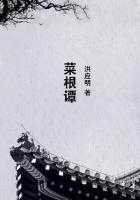And Proclus's prayer, on the other hand, was the outcome of the Neoplatonists' metaphysic, the end of all their search after the One, the Indivisible, the Absolute, this cry to all manner of innumerable phantoms, ghosts of ideas, ghosts of traditions, neither things nor persons, but thoughts, to give the philosopher each something or other, according to the nature of each. Not that he very clearly defines what each is to give him; but still he feels himself in want of all manner of things, and it is as well to have as many friends at court as possible--Noetic Gods, Noeric Gods, rulers, angels, daemons, heroes--to enable him to do what? To understand Plato's most mystical and far-seeing speculations. The Eternal Nous, the Intellectual Teacher has vanished further and further off; further off still some dim vision of a supreme Goodness. Infinite spaces above that looms through the mist of the abyss a Primaeval One. But even that has a predicate, for it is one; it is not pure essence. Must there not be something beyond that again, which is not even one, but is nameless, inconceivable, absolute? What an abyss! How shall the human mind find anything whereon to rest, in the vast nowhere between it and the object of its search? The search after the One issues in a wail to the innumerable; and kind gods, angels, and heroes, not human indeed, but still conceivable enough to satisfy at least the imagination, step in to fill the void, as they have done since, and may do again; and so, as Mr. Carlyle has it, "the bottomless pit got roofed over," as it may be again ere long.
Are we then to say, that Neoplatonism was a failure? That Alexandria, during four centuries of profound and earnest thought, added nothing?
Heaven forbid that we should say so of a philosophy which has exercised on European thought, at the crisis of its noblest life and action, an influence as great as did the Aristotelian system during the Middle Ages. We must never forget, that during the two centuries which commence with the fall of Constantinople, and end with our civil wars, not merely almost all great thinkers, but courtiers, statesmen, warriors, poets, were more or less Neoplatonists. The Greek grammarians, who migrated into Italy, brought with them the works of Plotinus, Iamblichus, and Proclus; and their gorgeous reveries were welcomed eagerly by the European mind, just revelling in the free thought of youthful manhood. And yet the Alexandrian impotence for any practical and social purposes was to be manifested, as utterly as it was in Alexandria or in Athens of old. Ficinus and Picus of Mirandola worked no deliverance, either for Italian morals or polity, at a time when such deliverance was needed bitterly enough. Neoplatonism was petted by luxurious and heathen popes, as an elegant play of the cultivated fancy, which could do their real power, their practical system, neither good nor harm. And one cannot help feeling, while reading the magnificent oration on Supra-sensual Love, which Castiglione, in his admirable book "The Courtier," puts into the mouth of the profligate Bembo, how near mysticism may lie not merely to dilettantism or to Pharisai**, but to sensuality itself. But in England, during Elizabeth's reign, the practical weakness of Neoplatonism was compensated by the noble practical life which men were compelled to live in those great times; by the strong hold which they had of the ideas of family and national life, of law and personal faith.
And I cannot but believe it to have been a mighty gain to such men as Sidney, Raleigh, and Spenser, that they had drunk, however slightly, of the wells of Proclus and Plotinus. One cannot read Spenser's "Fairy Queen," above all his Garden of Adonis, and his cantos on Mutability, without feeling that his Neoplatonism must have kept him safe from many a dark eschatological superstition, many a narrow and bitter dogmatism, which was even then tormenting the English mind, and must have helped to give him altogether a freer and more loving conception, if not a consistent or accurate one, of the wondrous harmony of that mysterious analogy between the physical and the spiritual, which alone makes poetry (and I had almost said philosophy also) possible, and have taught him to behold alike in suns and planets, in flowers and insects, in man and in beings higher than man, one glorious order of love and wisdom, linking them all to Him from whom they all proceed, rays from His cloudless sunlight, mirrors of His eternal glory.
But as the Elizabethan age, exhausted by its own fertility, gave place to the Caroline, Neoplatonism ran through much the same changes. It was good for us, after all, that the plain strength of the Puritans, unphilosophical as they were, swept it away. One feels in reading the later Neoplatonists, Henry More, Smith, even Cudworth (valuable as he is), that the old accursed distinction between the philosopher, the scholar, the illuminate, and the plain righteous man, was growing up again very fast. The school from which the "Religio Medici" issued was not likely to make any bad men good, or any foolish men wise.
Besides, as long as men were continuing to quote poor old Proclus as an irrefragable authority, and believing that he, forsooth, represented the sense of Plato, the new-born Baconian philosophy had but little chance in the world. Bacon had been right in his dislike of Platonism years before, though he was unjust to Plato himself. It was Proclus whom he was really reviling; Proclus as Plato's commentator and representative.
The lion had for once got into the ass's skin, and was treated accordingly. The true Platonic method, that dialectic which the Alexandrians gradually abandoned, remains yet to be tried, both in England and in Germany; and I am much mistaken, if, when fairly used, it be not found the ally, not the enemy, of the Baconian philosophy; in fact, the inductive method applied to words, as the expressions of Metaphysic Laws, instead of to natural phenomena, as the expressions of Physical ones. If you wish to see the highest instances of this method, read Plato himself, not Proclus. If you wish to see how the same method can be applied to Christian truth, read the dialectic passages in Augustine's "Confessions." Whether or not you shall agree with their conclusions, you will not be likely, if you have a truly scientific habit of mind, to complain that they want either profundity, severity, or simplicity.
So concludes the history of one of the Alexandrian schools of Metaphysic. What was the fate of the other is a subject which I must postpone to my next Lecture.














